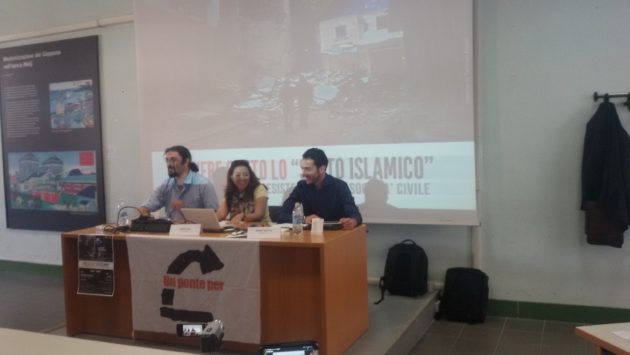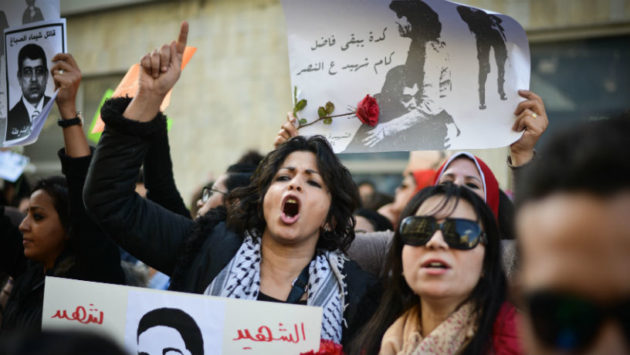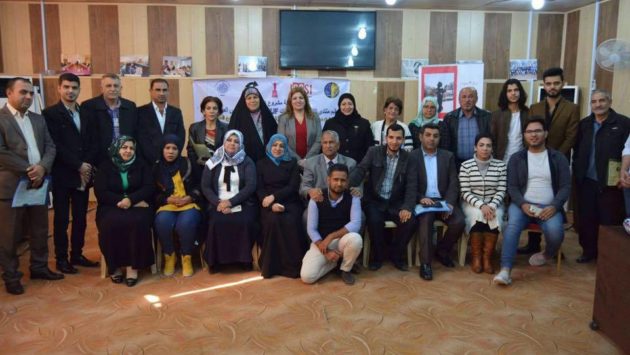Statement of Iraqi Women Network in Commemoration of 15th Anniversary of UN Res. 1325
Baghdad, Oct 31st, 2015
We passed the 15th anniversary of the adoption of Security Council Resolution 1325 on Women, Peace and Security, while many Iraqi women and girls have between displaced or abducted, made slaves and victims of sexual and physical violence, as a result of the escalating violence, terrorism and extremism, particularly after the events of 9 June 2014 and the subsequent occupation of one third of Iraq by the gangs of Daesh, perpetrators of the most heinous crimes of ethnic and religious cleansing. Those amount to war crimes, crimes against humanity and genocide, as contained in the report of the United Nations Office of High Commissioner for Human Rights in March 2015.
Under the atmosphere of unbridled violence, weak law enforcement institutions, the absence of protection mechanisms, the entrenching of tribal and religious customs and traditions, women are more vulnerable to physical and sexual abuse, domestic violence, and denial of basic rights such as education. Along with the emergence of phenomena and harmful practices such as child marriage, temporary marriage, trafficking in women, so-called honour crimes, women became the means to pay debts and settle clan disputes rather than be an active element in resolving disputes and negotiations, as stressed in the resolution 1325.
The Iraqi Women Network with its member non-governmental organizations, initiated many activities at the national, regional and international levels to combat terrorism and extremism and build civil peace and to highlight abuses and challenges faced by women as a result of extremist ideology and the continuation of armed conflicts, threatening the rights and gains obtained by women through decades of struggle in the past.
In this context, a Women’s Security Forum was held on UNSCR 1325 for the Middle East and North Africa, in Erbil in May 2015, under the title: “Women’s Resistance to Extremism and Terrorism, and their Struggle for their Rights, Peace and Security”. The Erbil Declaration came at the end of the Forum, stressing solidarity with women and girls who are victims of violent extremism in Iraq and Syria and across the Middle East and North Africa, and the need to activate the role of women in peace-building and conflict resolution, their participation in negotiations, and to promote a culture of non-violence, tolerance and the rejection of extremism, hatred and discrimination. Also, in late August, a National Conference titled “Empowering Women to Counter Terrorism” was hled by the United Nations Mission in Iraq. The conference focused its discussions on the emergency measures to implement Resolution 1325 National Action Plan (NAP), which was adopted by the Iraqi Government after the regional Women Security Forum. Both previous activities contributed to draw the attention of the international community to risks that Iraqi women face, and policy recommendations which have been reflected in the United Nations Security Council newly adopted resolution No. 2242 dated 31/10/2015.
We at the Iraqi Women Network speak out loud to mark the 15th anniversary of Resolution 1325, and call for:
- The international community to take immediate action to combat terrorism and extremism, and to seek the liberation of abducted women and girls and the prisoners and detainees held by Daesh terrorist militant group.
- The Iraqi Government to accede to the Rome Statute of the International Criminal Court, to ensure international criminal prosecution for offenders, reparation of victims, and the accountability of States and actors who support and fund the terrorist groups.
- Ensuring the necessary protection of women and children from the dangers of ongoing military operations, and the use of excessive force by security forces and armed groups.
- The Iraqi Government to support the Operations Room set up as a mechanism to implement the emergency plan for Resolution 1325 (NAP), and allocation of financial resources in the annual budget for 2016 to ensure the immediate protection and medical and psychological treatment and rehabilitation for displaced and abducted women and girls’ survivors, to secure the return of the displaced to their homes after liberation of their homes, to empower them to participate in the reconstruction of the stricken areas, as well as providing protection to displaced women with long-term strategies in support of their socio-economic rights.
- Officials of the Executive and legislative national bodies to reconsider the program of National Reconciliation in Iraq, to ensure the genuine participation of women in peace-building, security, conflict resolution and negotiation and social cohesion, in line with the content of the National Action Plan for Resolution 1325.
- The Iraqi Government to develop an alternative Independent National Mechanism that works for the advancement of women, and effective partnership between different State institutions and civil society organizations in monitoring the implementation of the National Strategy for the Advancement of Women
- Strengthening the process of political reform to build a State of equal citizenship and rule of law, and seek to amend the Constitution, lifting all articles and sectarian terms, including article 41 relating to personal status matters, as well as amending legislation, regulations and procedures that include discrimination and violence against women, that are contradictive to the provisions of the Constitution and the international obligations of Iraq in the field of human rights.
- The Government and United Nations agencies and international organizations to provide the necessary support to Iraqi civil society organizations, through long-term programmes aimed at empowerment and capacity-building in monitoring and documentation of crimes of sexual violence in conflict and afterwards, and to provide psychological, health, social and legal support for the victims, combating harmful practices and stereotypes against women that prevail under conditions of armed conflict, displacement and forced displacement.





